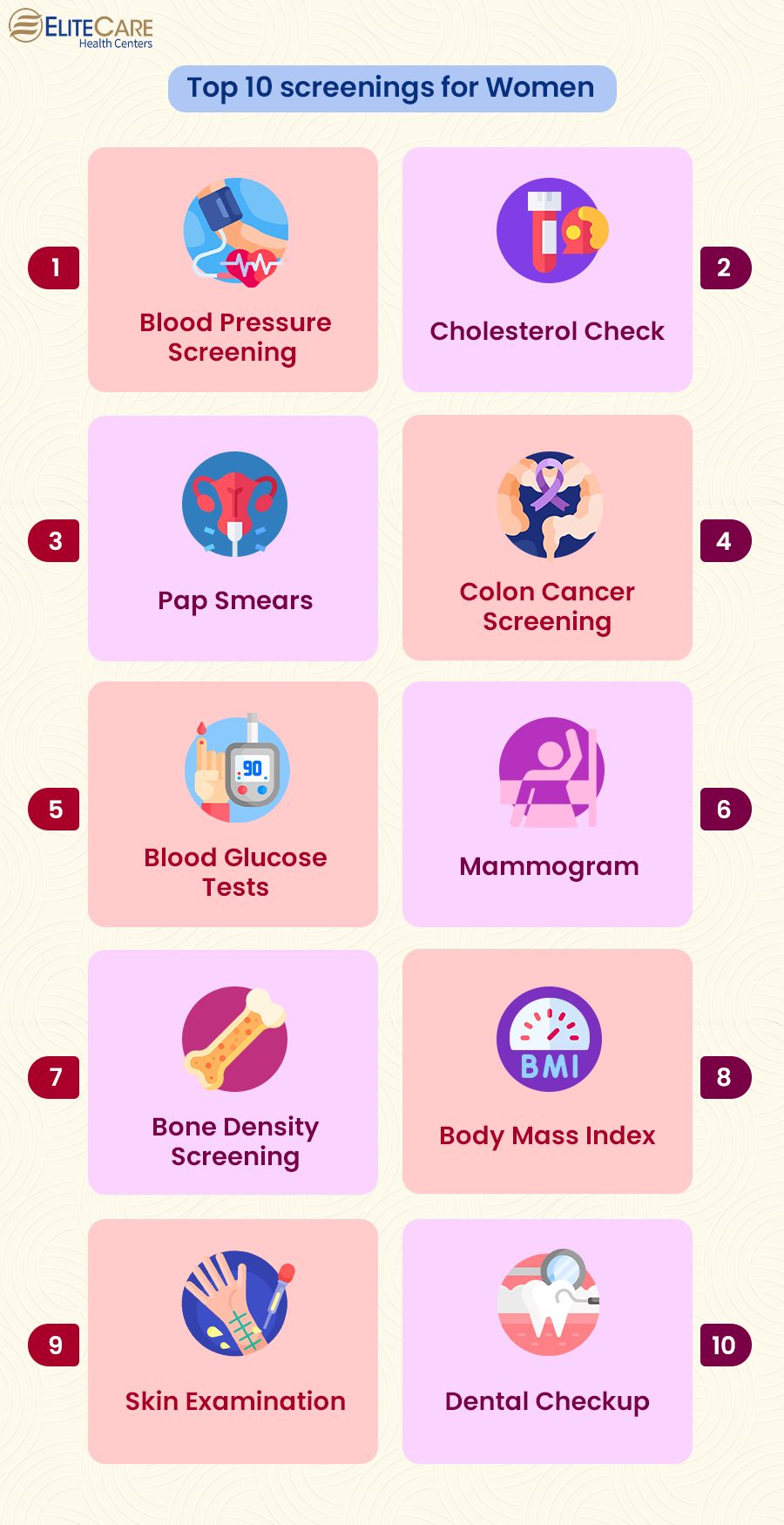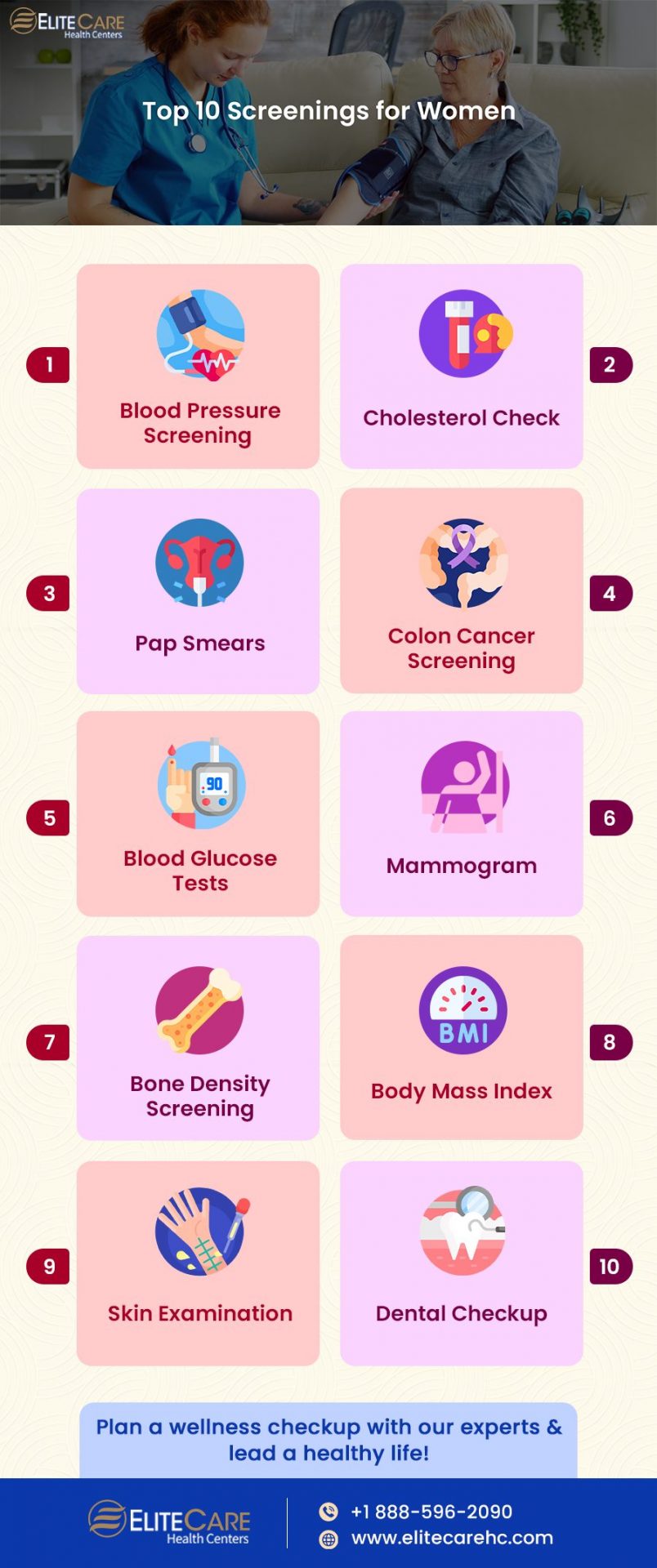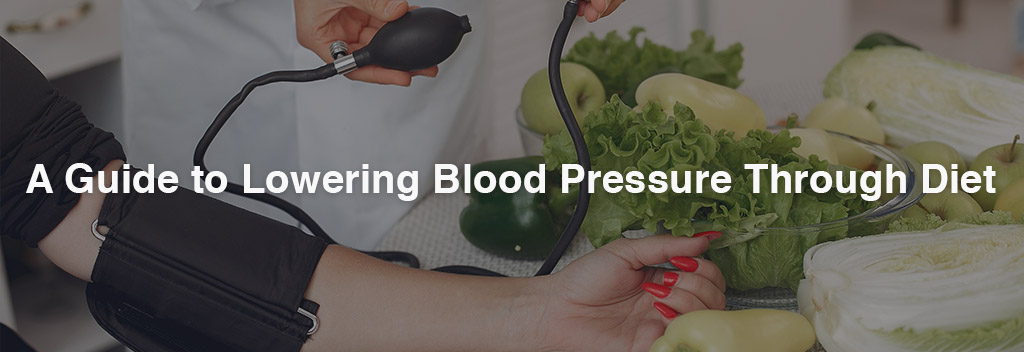
Every woman needs to set aside time for their health. Preventive care is under-appreciated across the US adult population and only 8% of them chose the necessary preventive care. It is therefore important to understand the relevance of preventive health screenings and how they can help in living a great quality of life.
Health screenings are critical because they detect anomalies in our body and spot any warning signs. There are a few basic health screenings and annual physical exam recommendations prescribed by doctors. The screening requirements can vary as you age. Also, personal and family medical histories may require you to look out for certain health conditions sooner or more frequently than what is normally advised.
Here are the top 10 checkups and screenings for women:

1. Blood Pressure Screening
According to research, over 47% of the US population have hypertension, or are taking medication to treat it.Hypertension increases the risk of having a stroke or heart disease which are among the leading causes of death.
For women below 40, blood pressure screening may be done once every two years unless it goes below the optimum level of 120/80 (mm Hg). However, for women who are 40+, it is advisable to undergo the screening on a yearly basis especially those who are suffering from obesity or hypertension.
According to the American Heart Association (AHA) people diagnosed with hypertension should monitor their blood pressure at home. Regularly monitoring blood pressure at home enables the healthcare experts to assess how well your treatment is working.
People with a family history of blood pressure are twice as likely to develop high blood pressure if one or more of your blood relatives have it before 60. Also, women are more prone to develop high blood pressure (hypertension) if they are below 20 or above 40 years of age during pregnancy. These are critical and personal factors that are to be noted in the case of blood pressure screening.
2. Cholesterol Check
A complete cholesterol check or lipid profile can determine your risk of having heart disease or a stroke. The National Institutes of Health recommend having your cholesterol checked at least once every five years if you are 20 years of age or older. Consult your physician to determine the frequency of your blood test if you are at risk for heart disease or stroke.
However, shorter screening intervals are advised for those with cholesterol levels, especially those using specific drugs for diabetes, hypertension, obesity etc. Or those with a personal or family history of cardiovascular disease.
3. Pap Smears
Cervical cancer is one of the deadliest diseases in the US, with approximately 13,000 new cases being reported each year. Cervical cancer is preventable with proper screening done using a Pap smear to identify cellular abnormalities in the cervix before they become malignant. Regular Pap smears have helped to lower the rates significantly.
Cervical cancer screenings should begin when you are 21 years old. If the test findings are normal, you may wait three years until your subsequent testing and maintain that gap until you are 29. If your findings are consistently normal, you can undergo testing every five years between the ages of 30 and 65.
4. Mammograms
Mammograms are performed as a screening test for breast cancer in women with or without cancer-related symptoms. Regular mammograms are the most effective diagnostic tool for doctors to detect breast cancer early (when it is most treatable) and often years before it can be felt.
The risk of breast cancer increases with age, and the radiation from a mammogram also puts the woman at risk. According to the USPSTF’s most recent recommendations, women should begin getting mammograms every two years from 50 years onwards.
5. Bone Density Screening
Beginning at age 65, women should undergo bone density testing as part of their osteoporosis screening as they are at higher risk than men and it increases with age. Those with osteoporosis risk factors, hip fractures or a low body mass index, should be tested more often. The bone density screening helps determine how strong your bones are and will reveal if you have osteoporosis. It can predict chances of bone breakage in the future.
6. Blood Glucose Tests
In order to screen for diabetes or prediabetes, women should start getting blood glucose tests every three years starting at the age of 45. You may want to start earlier and get screened more frequently if you are obese, have a family history of diabetes. Make sure to discuss how often and when you should get tested with your doctor.
7. Colon Cancer
Doctors perform a colonoscopy to check the rectum and colon lining for indications of colorectal cancer. Additionally, it can assist your doctor in determining the cause of intestinal symptoms such as rectal bleeding, abdominal pain, and changes in bowel habits. Beginning at age 50, you should get a colonoscopy every ten years.
8. Body Mass Index
It is recommended that BMI screening for obesity should start at the age of 18. Although there are no set rules for how frequently your doctor should take this measurement, it is nevertheless a crucial figure. Your BMI tells you if you are obese, which increases your chance of developing significant health issues like diabetes and heart disease. A low BMI can however result in different health problems including bone loss, decreased immune function, and anemia.
9. Skin Examination
The American Cancer Society recommends that women check their skin at home once a month for signs of cancer. Look closely at your entire body for any new moles or changes to any existing ones, as these could be early indications of skin cancer. Consult a dermatologist if you are at increased risk for developing skin cancer – people with lighter colored skin, blond, etc. or if you have a family history.
10. Dental Checkup
Women should visit the dentist at least twice a year. Regular dental checkups, which include cleaning, examination, and X-rays of the teeth. The dentist may also be able to understand and answer your questions about symptoms and also check for early indications of decay.
Read More: Top 10 Men’s Health Checkups and Screenings
Summing it up
It is best to speak with your personal physician about screenings and annual health checkups that you should undertake on the basis of your current health status. Depending on risk factors, additional testing may be required. Regular and thorough screenings can typically detect diseases early enough to offer you the best chance of beating them. Contact EliteCare Health Center and schedule an appointment to get your annual screenings done.






